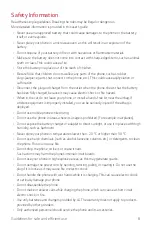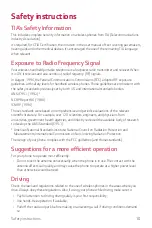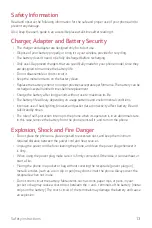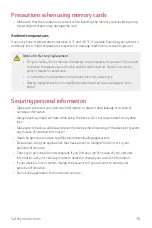
10
Safety instructions
Safety instructions
TIA’s Safety Information
This includes complete security information on wireless phones from TIA (Telecommunications
Industry Association).
It’s required, for CTIA Certification, the inclusion in the user manual of text covering pacemakers,
hearing aids and other medical devices. It’s encouraged the use of the remaining TIA language
when relevant.
Exposure to Radio Frequency Signal
Your wireless handheld portable telephone is a lowpower radio transmitter and receiver. When
it is ON, it receives and also sends out radio frequency (RF) signals.
In August, 1996, the Federal Communications Commissions (FCC) adopted RF exposure
guidelines with safety levels for handheld wireless phones. Those guidelines are consistent with
the safety standards previously set by both U.S. and international standards bodies:
ANSI C95.1 (1992) *
NCRP Report 86 (1986)
ICNIRP (1996)
Those standards were based on comprehensive and periodic evaluations of the relevant
scientific literature. For example, over 120 scientists, engineers, and physicians from
universities, government health agencies, and industry reviewed the available body of research
to develop the ANSI Standard (C95.1).
* American National Standards Institute; National Council on Radiation Protection and
Measurements; International Commission on Non-Ionizing Radiation Protection.
The design of your phone complies with the FCC guidelines (and those standards).
Suggestions for a more efficient operation
For your phone to operate most efficiently:
•
Do not touch the antenna unnecessarily, when the phone is in use. The contact with the
antenna affects call quality, and may cause the phone to operate at a higher power level
than otherwise would be need.
Driving
Check the laws and regulations related to the use of wireless phones in the areas where you
drive. Always obey these regulations. Also, if using your phone while driving, make sure to:
•
Pay full attention to driving; driving safely is your first responsibility;
•
Use hands-free operation, if available;
•
Pull off the road and park, before making or answering a call, if driving conditions demand
so.
Summary of Contents for LM-X210HM
Page 17: ...Custom designed Features 01 ...
Page 41: ...Basic Functions 02 ...
Page 78: ...Useful Apps 03 ...
Page 128: ...Settings 04 ...
Page 152: ...Appendix 05 ...
Page 163: ......












































